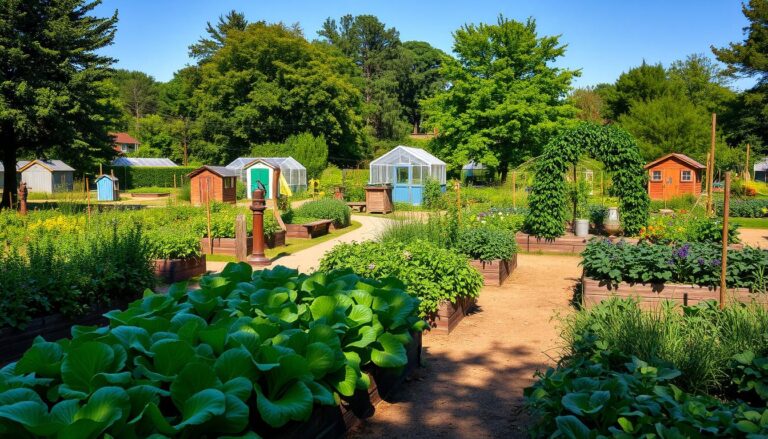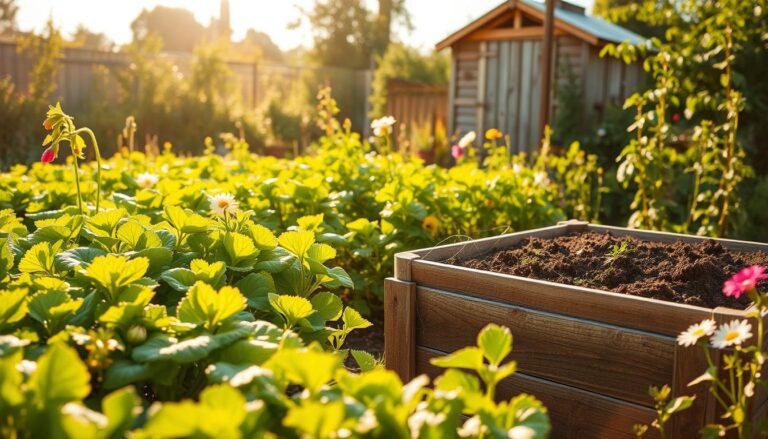Growing a garden can be very rewarding. But, dealing with unwanted visitors can be frustrating. Chemical pesticides might seem like a quick fix. However, they can harm the environment and your health.
Instead, consider eco-friendly pest management methods. These methods help create a balanced ecosystem.
Maintaining an organic garden needs a holistic approach. It focuses on natural solutions to manage pests effectively. By using these practices, you’ll protect your plants and help the environment.
In this article, we’ll look at effective and sustainable ways. These methods will help your garden thrive without harming the planet.
Understanding Garden Pests and Their Ecosystem
It’s key to know the garden pest ecosystem for organic gardening. Pests can harm plant health and growth. So, it’s vital to understand their role in the garden.
Common Garden Pests in American Gardens
Gardens in America face many pests, like aphids, slugs, snails, and caterpillars. These pests can damage plants, lowering yields and garden health. Identifying the pest type is the first step to manage them well.
The Pest Life Cycle and Vulnerabilities
Pests have different life cycles. Knowing these cycles helps find their weak points. Pests are often easier to control at certain life stages. This knowledge boosts the success of natural pest control methods.
Environmental Impact of Chemical Pesticides
Chemical pesticides harm the environment. They affect not just pests but also good insects and the ecosystem. Using non-toxic pest control is key for a healthy garden.
| Pest Control Method | Effectiveness | Environmental Impact |
|---|---|---|
| Chemical Pesticides | High | Negative |
| Natural Pest Control | Variable | Positive |
Organic Gardening Pest Control: Core Principles
Organic gardening pest control is more than just getting rid of pests. It’s about making your garden a balanced and healthy place. This method uses sustainable practices for long-term results, not quick fixes.
Building a Resilient Garden Ecosystem
A strong garden ecosystem is the base of organic pest control. It means having a diverse and lively garden where plants can thrive. Diversity is essential; different plants attract many beneficial insects and microorganisms. These help control pests naturally.
Integrated Pest Management Approach
An Integrated Pest Management (IPM) approach is key for sustainable pest control solutions. IPM uses various methods like crop rotation, biological control, and cultural controls. This approach manages pests while protecting beneficial organisms and the environment.
- Crop rotation to break pest cycles
- Biological control using natural predators or parasites
- Cultural controls, such as pruning or sanitation, to prevent pest buildup
Long-term Benefits of Natural Solutions
Using organic pest repellents and natural solutions has many benefits. These include better soil health, more biodiversity, and less chemical residues. Choosing sustainable pest control helps create a healthier ecosystem and a greener future.
By following these core principles, gardeners can build a strong and resilient garden. This garden can fight off pests without harmful chemicals.
Preventive Strategies for Natural Pest Management
Preventive strategies are key to natural pest management in organic gardening. They help gardeners avoid chemical pesticides and create a healthier environment.
Building Healthy Soil as Your First Defense
Healthy soil is the base of a strong garden. It helps plants grow well and fight off pests. To make healthy soil, add compost, keep the right pH, and avoid too much tillage.
- Add compost or well-rotted manure to improve soil fertility and structure.
- Use cover crops to enhance soil health and biodiversity.
- Minimize the use of chemical fertilizers, which can disrupt soil balance.
Strategic Companion Planting
Companion planting is a smart way to fight pests. Some plants keep pests away or attract good bugs. For instance, marigolds with tomatoes can keep nematodes away.
- Marigolds repel nematodes and other pests.
- Basil repels aphids and improves tomato flavor.
- Nasturtiums attract aphids away from other plants.
Garden Layout and Design for Pest Resistance
A well-planned garden is also key in pest control. Think about plant spacing, diversity, and good bug habitats. This helps prevent pest problems.
Key considerations include:
- Plant a variety of crops to stop pests from spreading.
- Make sure plants are far enough apart for good air flow.
- Choose plants that attract beneficial insects.
By using these strategies, gardeners can manage pests naturally. This makes their gardens healthier and more sustainable.
Effective Natural Repellents and Solutions
Keeping your garden healthy is key. Using natural repellents and solutions helps. This way, you can protect your plants without using harmful chemicals.
One easy method is DIY Organic Pest Sprays. You can make them with things you have at home. For example, a mix of garlic, hot peppers, and water can keep many pests away.
DIY Organic Pest Sprays
To make a garlic spray, blend 3 cloves of garlic with 1 quart of water. Let it sit overnight. Then, strain it before spraying it on your plants. This spray can keep aphids and other pests away.
Essential Oils and Plant-Based Deterrents
Essential oils from plants like peppermint, lemongrass, and lavender can also repel pests. Mix a few drops of these oils with water and spray them around. Plants like marigolds and basil can also keep pests away. Plant them in your garden to help.
| Plant | Pest Repelled |
|---|---|
| Marigolds | Nematodes, Whiteflies |
| Basil | Aphids, Flies |
| Lavender | Moths, Flies |
Homemade Traps and Barriers
Building homemade traps and barriers is another good way to control pests. For example, you can make a trap with a jar, sugar water, and apple cider vinegar. Cover it with plastic wrap and poke holes in it. Fruit flies will be attracted and trapped.
Using these natural methods in your garden can keep it balanced. This way, you’ll have a healthier and more productive garden.
Biological Pest Control Methods
For gardeners looking for safe pest control, biological methods are a great choice. These methods use living things or their products to fight pests. They are a green alternative to chemical pesticides.
Beneficial Insects: Your Garden Allies
Beneficial insects like ladybugs and lacewings eat common pests. By drawing these insects to your garden, you can keep pest numbers down naturally. Planting a variety of flowers, especially those with lots of nectar, helps attract them.
Microbial Controls and Organic Treatments
Microbial controls use tiny living things like bacteria and fungi to fight pests. For example, Bacillus thuringiensis (Bt) is a bacterium that kills certain pests. It’s a safe way to control pests without harming the environment.
Creating Habitat for Natural Predators
It’s important to make your garden a welcoming place for natural predators. This means planting native plants, keeping areas connected, and providing food and shelter. A diverse garden ecosystem helps natural predators thrive, keeping pests under control.
Using biological pest control methods makes your garden healthier and more balanced. It reduces the need for harmful chemicals. This approach supports a sustainable gardening practice, following eco-friendly pest management principles.
Seasonal Pest Control Strategies
Knowing when pests are most active is crucial for organic pest control. Each season brings different pest challenges and opportunities. By adapting to these changes, you can keep your garden healthy and pest-free.
Spring Preventive Measures
Spring is the time to defend your garden against pests. Start by removing debris and weeds that pests hide in. Use companion planting to keep pests away. Plants like marigolds and nasturtiums can repel aphids and other pests.
- Remove weeds and debris to reduce hiding places for pests.
- Plant pest-repellent herbs like basil and mint around the perimeter of your garden.
- Use physical barriers to protect young seedlings from pests.
Summer Pest Management Techniques
Summer is when pests are most active, so you need to act fast. Keep an eye out for pests and use organic pest control methods like neem oil. Attracting beneficial insects, like ladybugs and lacewings, can also help control pests.
- Regularly inspect your plants for signs of pest damage.
- Apply organic pest control treatments as needed.
- Encourage beneficial insects by planting a diverse range of flowers.
Fall and Winter Preparation
When the growing season ends, prepare your garden for next year. Clean up your garden and remove any infested plants. Add compost to improve soil health. This makes your garden less welcoming to pests.
- Remove infested or diseased plants to prevent pest overwintering.
- Add compost or other organic matter to enhance soil health.
- Plan your garden layout for the next season, incorporating pest-resistant strategies.
Conclusion
Organic gardening pest control helps create a balanced garden ecosystem. It promotes healthy plant growth and reduces the need for chemicals. Biological pest control uses natural predators and beneficial insects to control pests.
Preventive strategies, natural repellents, and biological controls can keep your garden pest-free. Healthy soil, strategic companion planting, and natural habitats for predators are key. These steps help reduce chemical pesticide use and support sustainable gardening.
By using these methods, your garden will thrive and be resilient. Explore organic and biological pest control to enjoy a healthier, more balanced garden.
FAQ
What is organic gardening pest control?
Why is it important to avoid chemical pesticides in gardening?
What are some effective natural pest control methods?
How can I identify common garden pests?
Can I use essential oils for pest control in my garden?
How does companion planting help with pest control?
What is integrated pest management (IPM), and how does it work?
Are biological pest control methods effective?
How can I create a pest-resistant garden through design?

Sortemdia nasceu com o propósito de trazer alegria e oportunidades para todos por meio de sorteios gratuitos de prêmios incríveis. O site tem como missão oferecer experiências acessíveis, divertidas e justas para quem deseja concorrer a produtos, serviços e brindes sem pagar nada por isso. Acreditamos que a sorte pode bater à porta de qualquer pessoa — e no Sortemdia, ela pode chegar com apenas um clique.



